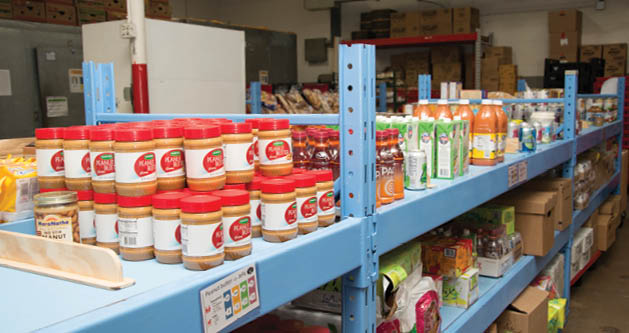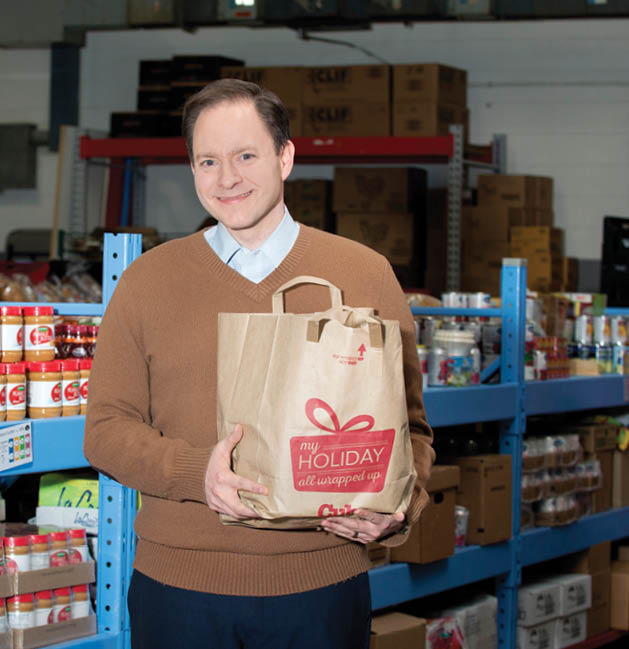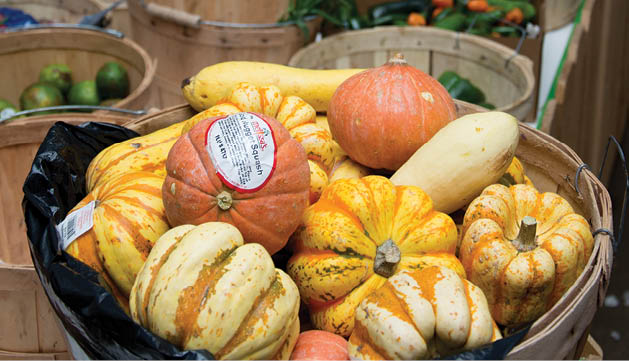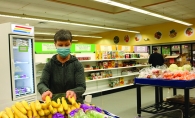March is a very important month for two Plymouth-area food shelves—and the people they serve.
Each year since 1982, Minnesota FoodShare (MFS), a major program of the Greater Minneapolis Council of Churches (GMCC), has staged its Minnesota FoodShare campaign March 1–31. It’s the largest grassroots food and fund drive in Minnesota dedicated to raising awareness of statewide hunger.
Through the years, the annual month-long campaign has helped to raise approximately $8 million dollars and 4 million lbs. of food for the 300 food shelves across the state. The campaign generates more than half of the food that Minnesota’s food shelves distribute throughout the year.
Yet in spite of the impressive amount of help the FoodShare-affiliated shelves have provided through the years, the need has only grown. The staff at Interfaith Outreach & Community Partners (IOCP) quote a startling statistic: 55 percent of the Twin Cities poor population now lives in the suburbs. “Many Minnesotans don’t understand how fast suburban poverty is growing,” says Suzanne Shatila, program director of Minnesota FoodShare. “The Twin Cities have been identified by the Brookings Institution as one of the fastest-growing areas in the country for suburban poverty.”
Given the growing need, the 2016 campaign organizers want to set a new record for food and financial donations. According to Lynn Vettel, community engagement director for IOCP, they believe that, by improving visibility, the March campaign is capable of raising much greater awareness, participation and funding than ever before.
One of 2016’s enthusiastic backers is WCCO-TV personality and foodie Jason DeRusha, who is this year’s honorary chairman.

“I’m passionate about doing whatever I can to fight hunger. As someone who covers the food industry in the Twin Cities, I am so lucky my family doesn’t have to worry about where their next meal is coming from,” he says. “We live in the western suburbs, and I know there are kids who go to my kids’ school who sometimes don’t know where they are going to get food. So I jumped at this opportunity.” DeRusha, whose wife Alyssa is a Plymouth native, adds, “It’s great to get a chance to shine some light on the 300-plus food shelves that serve the state.”
Minnesota FoodShare and the campaign have unique roles in the emergency food system, because “we help food shelves raise cash, which is critical for purchasing items most needed from the regional food banks and other food discount programs,” Vettel says.
The two food shelves that serve families and individuals in the Plymouth area are IOCP’s food shelf off County Road 101 in western Plymouth and the PRISM (People Responding in Social Ministry) food shelf at 730 Florida Ave. S. in Golden Valley.
IOCP’s food shelf has been serving area residents since opening in Wayzata in 1979; the entire operation moved to its current location in a former grocery store at 1605 N. County Road 101 in 2011. The extra space provided by the renovated 40,000-square-foot facility has been crucial in helping IOCP serve its clients. Rather than picking up pre-selected bags of food, clients can browse the shelves and pick out the items. IOCP has also developed a one-stop shop to provide a “holistic” range of social services to families. The facility offers an employment agency and case-management assistance, with a Hennepin County Human Services and Public Health Department satellite office and a Wayzata Public Schools Community Education office also at the site.
“While food may be the first thing that brings someone to our door, the families are often in crisis,” Vettel says. “So, we try to find out what the underlying needs are. Because of a long-term medical illness or lost job or some other situation, they may have exhausted all of their other resources.” In these cases, clients in crisis are encouraged to meet with on-site social workers and case managers who can help them. Emergency financial aid can be provided to cover necessities such as rent, child care or transportation. Lawyers are also available to provide longer-term, pro bono assistance needed to stabilize and strengthen a family.
Any of those services can help prevent future problems, which, if left unchecked can lead to more poverty and hunger. “We do encourage families to use the food shelf as long as they need to, as a safety net,” Vettel says. “The wonderful thing about a food shelf is that it is based on community donations and involves every aspect of the community.”
The IOCP food shelf serves about 200 families per week in an area that includes Hamel, Medicine Lake, Medina, Long Lake, Orono, Wayzata, Minnetonka Beach and Plymouth (west of 494), according to Deb Sakry Lande, communications director for IOCP. It distributes an average of about 75,000 pounds of food per week. In 2015, IOCP served a total of 2,033 area households, 4,452 individuals and 1,545 unique (not counting multiple visits) households, Lande says: “There is no ‘typical’ family served, since every situation is unique.”
According to executive director Michelle Ness, the PRISM food shelf started in 1970 at St. Joseph’s Parish in New Hope, “along with [the assistance of] other like-minded faith partners.” PRISM, which incorporated as a nonprofit in 1983, serves 500 to 600 in its Marketplace Food Shelf. Visitors receive a week’s worth of perishables (milk, eggs, meat, cheese), as well as nonperishables (peanut butter, bread, cereal and tuna).
Of course, the IOCP shelf and others like it could not function without the help of volunteers. The IOCP shelf is staffed by nearly 400 volunteers and two part-time employees; in total there are nearly 800 volunteers who have helped out. One of the volunteers’ vital functions is visiting local grocers and restaurants to pick up donated food on a daily basis.
“We try to access food from all points of the community, to make sure there is enough to meet the need. I’m constantly in awe of these amazing volunteers,” Vettel says. “Clients say things like, ‘they made me feel special,’ ‘it was an amazing experience,’ ‘they are all so kind.’ We work hard to make sure all of our clients feel valued as they are walking through the facility.”


Hungry for More?
To help involve everyone in the community, each week of the 2016 FoodShare March campaign will have a specific theme:
February 27–March 4: Collect in the Classrooms (in schools)
March 5–11: Cram the Cubicles (corporations and small businesses)
March 12–18: Kick-in at the Kitchens (local restaurants)
March 19–25: Pack the Pews (congregations)
March 26–April 1: Stuff the Stores (grocers and other stores)
For more information on participating, visit the website here.









